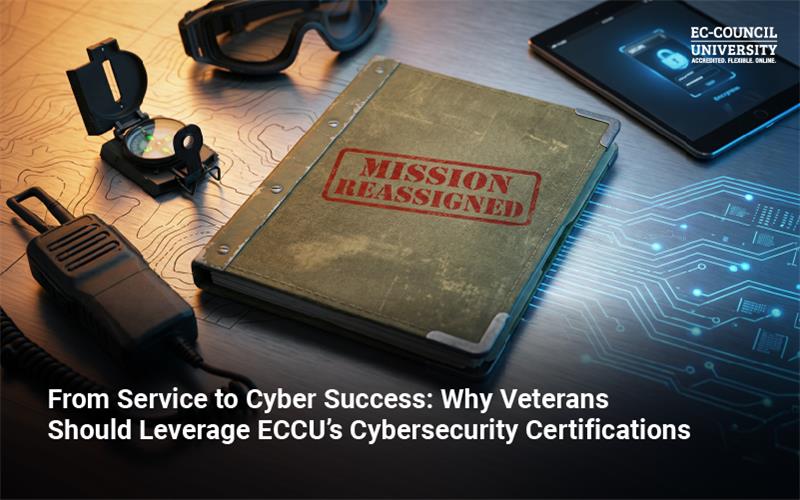Cybersecurity is today the core of any business. Any data breach, ransomware attack, or phishing scam brings the entire business to a standstill. Cyber incidents like these can disrupt operations, cost huge amounts of money, and invite regulatory scrutiny. For these reasons, organizations across the globe are investing more in their security infrastructure and cybersecurity talent.
Today, the global cybersecurity market is projected to reach USD 562.77 billion by 2032 (source: Fortune Business Insights). Moreover, the current global cybersecurity unfilled job market stands at 4.8 billion (source: World Economic Forum). So, this makes it the best time to enter the cybersecurity industry.
If you are considering entering or building a rewarding career path in Cybersecurity, pursuing a Master’s in Cybersecurity would be the smartest move you can make today.
Why Pursue a Master's in Cybersecurity Today?
Today, a master’s degree in Cybersecurity truly matters as it’s the need of the hour. Today’s global cybersecurity industry faces a severe talent shortage, especially at advanced technical and leadership levels. That’s when a professional with a master’s degree in Cybersecurity makes a difference in the industry.
The master’s degree keeps you current (technical + theoretical), gives credibility, and can differentiate in hiring and promotions. However, specializing in a technical MS in Cybersecurity or opting for a more strategic MBA in Cybersecurity, it is a choice you need to make.
So, to make things easy for you, here’s a guide you should explore to discover both options. Decide which degree aligns with your career goals and make the right choice.
Career Path Choice: MS in Cybersecurity vs MBA in Cybersecurity
1. MS in Cybersecurity: The Technical Specialist's Path
Who Is It Ideal For?
An MS in Cybersecurity is designed for professionals seeking technical expertise. It is a career path ideal for
- Graduates with a Computer Science, IT, Engineering, or Mathematics background
- Current IT professionals looking to transition into cybersecurity roles
- Individuals are passionate about ethical hacking, cryptography, threat detection, and digital forensics.
- Tech-savvy learners who enjoy hands-on problem solving
Whether starting fresh, aiming to pivot from a related technical domain, or advancing your career, the Master of Science in Cybersecurity degree helps you level-up with the relevant skills, knowledge, and tools to dive into the technical side of Cybersecurity.
What does the program typically offer?
Most MS in Cybersecurity programs offer a structured curriculum focused on technical mastery. Here’s what you can expect:
Core Subjects:
- Network and Systems Security
- Secure Programming and Software Development
- Penetration Testing and Ethical Hacking
- Security and Vulnerability Analysis
- Cybersecurity Risk Management
- Incident Handling and Response
- Business Continuity and Disaster Recovery
- Cloud Security Architecture
- Digital Forensics
Hands-On Learning:
Lab-based learning environments, capstone projects, and real-world simulations.
Certifications Inclusions:
Some institutions provide certifications along with programs. For example, EC-Council University Programs align with leading EC-Council certifications, such as CND, CPENT, CEH, CCISO, CHFI, and more, in their Master of Science in Cybersecurity program. The certifications earned give graduates a competitive edge in the industry and job market.
Benefits of Pursuing an MS in Cybersecurity
- Technical Specialization: Deep dive into the workings of cyber threats, defense strategies, and security architecture.
- High Demand for Skills: Gain technical skills, including security analysis, ethical standards, leadership, critical thinking, and research.
- Career Flexibility: Prepares you for diverse roles—from penetration tester to security architect.
- Higher Earning Potential: Specialized technical roles in Cybersecurity often command six-figure salaries.
- Certifications and Research: Opportunity to earn additional certifications or pursue academic research and PhDs.
Career Opportunities with an MS in Cybersecurity
A master’s degree opens the door to some of the most sought-after technical roles in the industry:
- Cybersecurity Analyst
- Penetration Tester (Ethical Hacker)
- Security Engineer
- Network Security Specialist
- Security Architect
- Digital Forensics Analyst
- Incident Responder
- Cryptographer
- Threat Intelligence Specialist and more.
Industries hiring include tech, healthcare, finance, defense, government, and cloud services.
2. MBA in Cybersecurity: The Leadership and Strategy Route
Who is it Ideal For?
An MBA in Cybersecurity works perfectly for those professionals who want to lead business strategies, cybersecurity initiatives, align security with business objectives, and manage teams. This may include-
- Business managers seeking to enter the cybersecurity field
- Experienced professionals in IT, risk, or compliance roles
- Professionals aspiring for executive roles like CISO (Chief Information Security Officer)
- Security professionals looking to move from technical roles into management or strategy
This path is less about hands-on coding and more about leading Cybersecurity at an organizational level.
What does the program typically offer
An MBA in Cybersecurity combines core business principles with security leadership training. The program includes core business and cybersecurity curriculums like-
Core MBA Curriculum:
- Business Strategy and Operations
- Leadership and Management
- Finance, Marketing, Accounts Management
- Project Management
- Organizational Behavior
Cybersecurity-Specific Modules:
- Cyber Risk and Governance
- Regulatory Compliance
- Business Continuity Planning
- IT Audit and Risk Management
- Information Security Policies
- Cybersecurity Laws and Ethics
Hands-on Learning:
Programs may include business case studies, capstone projects, or real-world security planning simulations.
Benefits of Pursuing an MBA in Cybersecurity
- Leadership Roles: Equipped to lead high-level leadership roles.
- Management Skills: Develop skills to manage security teams and influence executive decisions.
- Strategic Thinking: Learn how Cybersecurity fits into broader business goals.
- Global Career Opportunities: Prepare to collaborate and work with multinational companies and federal and government agencies.
- Broader Career Scope: Transition into Consulting, GRC, Policymaking, and more.
- Networking Opportunities: Connect with industry leaders through alumni networks and business events.
Career Opportunities with an MBA Degree in Cybersecurity
An MBA Degree in Cybersecurity can open doors to high-impact, leadership roles like-
- Chief Information Security Officer (CISO)
- Cybersecurity Program Manager
- Risk and Compliance Officer
- IT Governance Leader
- Security Policy Advisor
- Cybersecurity Consultant
- Director of Information Security
The leadership roles require both technical understanding and business acumen—precisely what the MBA provides.
MS vs MBA in Cybersecurity: A Quick Comparison Master’s Program
| Feature | MS in Cybersecurity | MBA in Cybersecurity |
|---|---|---|
| Current Role/Experience | Early, mid-career, and experienced professionals from IT, Data Science, and Security Industries. | Early, mid-career, and experienced professionals from Business, IT, Security, Finance, Healthcare, and other Industries. |
| Educational Background | Computer Science, Engineering, IT, Math | Business, Law, Finance, IT, Cybersecurity, Generalist background |
| Skill Development Focus | Technical depth in penetration testing, forensics, ethical hacking, etc. | Business acumen in organizational strategy, leadership, security alignment, risk management, compliance, etc. |
| Career Aspirations | Technical specialization – Security Engineer, Ethical Hacker, Threat Analyst, Architect, R&D | Strategic Leadership, C-suite role – CISO, Security Program Manager, Cybersecurity Consultant, Risk/Compliance Lead |
| Career Shift | Switching into cybersecurity from IT or engineering | Moving from managers, risk officers, and executives into leadership roles within security or broader business units |
| Duration | 2 years | 2 years |
| Career Roles | Analyst, Engineer, Architect | Manager, CISO, Consultant |
| Starting Salary (US) | ~$90K–$120K+ | ~$100K–$150K+ |
| Learning Style | Labs, projects, coding | Case studies, presentations, projects |
Conclusion: Choosing the Right Degree for Your Cybersecurity Career
The MS in Cybersecurity and MBA in Cybersecurity are powerful degrees, offering the best ROI in terms of career advancements, growth, and salaries. But each of the degrees serves different goals.
If your passion lies in understanding the inner workings of threats, securing systems, and working on the frontlines of defense, an MS in Cybersecurity is your best bet. If you see yourself setting business strategies, leading organizations, managing risk, and aligning security with business priorities, then an MBA in Cybersecurity could be the ideal path.
Ultimately, your background, goals, and interests should guide your decision. Either way, with a master’s degree, you will be entering a dynamic, critical field filled with opportunity.







